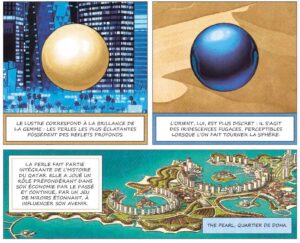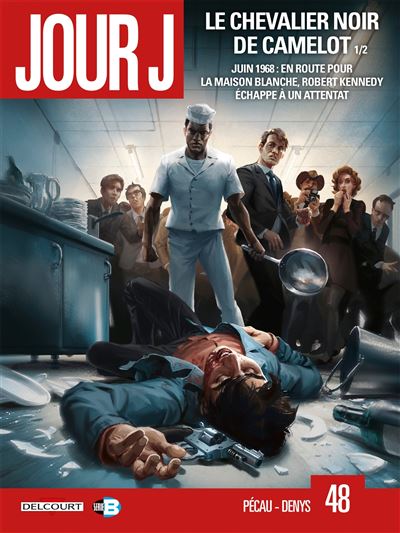Since the World Cup, Qatar has been in the spotlight. However, its history is poorly known… until this column. Discover the emirate in comics by Le lustre de l'Orient.
It all starts with the story

Qatar, the luster of the Orient is not a travel guide for tiktokeur but an ample saga. The story of screenwriters Victor Valentini and Emmanuel Picq remains very pleasant to read, thanks to excerpts from speeches such as that of US President Jimmy Carter, and by invented dialogues between the powerful. In its early days, Qatar's main activity was pearl harvesting. The collapse of pearl mono-activity traumatized the country. The territory then lived under the domination of the Ottoman Empire, Bahrain and the United Kingdom while being threatened by neighboring countries. Qatar will always seek to diversify and keep its independence by playing on power rivalries.
The luster of the East then exceeds national history because the emirate constantly needs external support in the face of powerful neighbors and regional upheavals. The screenwriters Victor Valentini and Emmanuel Picq draw a very fine cartography of the region with Saudi Arabia rival power, the great powers, British and American. We also see the appearance of Israel and then the Iranian revolution. We even go on a global scale after the attacks of September 11, 2001. Qatar chooses to support the United States to serve its interests and weaken its powerful neighbor.
Between West and East

Culturally and politically, Qatar is an ambiguous synthesis between East and West. The country wants to be the fusion between tradition and modernity but without ever adopting democracy. The al-Thani family has ruled since the establishment of the emirate. Behind this stability, the country is affected by an oscillation between dynastic continuity, family and political tensions. This situation explains why aging or weakened emirs are regularly deposed. These power shifts become a successful recurring joke in the book.
We also discover the economic policy of the emirate. Today, the emirate is creating a modern form of authoritarian rule. Power exchanges material well-being and free public services for the loss of freedom. This agreement led to an opposition between economic modernism and social conservatism such as women's late right to vote.
To illustrate all the complexity of Qatar, cartoonist and colorist Emmanuel Picq adopts a realistic style. However, he avoids banal photorealism by a light inking and especially a colorization close to watercolor. This choice creates material and softness contrasting with the coldness and violence of the facts. The chandelier of the Orient resembles a book illustrated by the presence of an important text around these images. We find this form by the narrative in chapter with titles. However, the reader does not always understand the choice of images: an emir in his bed with his second wife.
Taking advantage of the mass of oil and especially gas, Emir Ahmad Ben Ali Al Thani chose soft power. He created Al Jazeera which became the brand image of the country and its modernity but there was a clear border: the impossibility of talking about Qatar's internal affairs. With the attack of September 11, 2001, the Arabic channel became a global sounding board by broadcasting Bin Laden's messages. This desire to influence the world also involves hosting branches of the largest Western universities and investing in transnational companies.
When the publisher Delcourt offers in his collection Encrages a comic strip on Qatar, the reader might fear a heavy history of a small country. However, by the successful drawings and the right choice of the different events, the reader never gets bored. Moreover, when the second part of the book shows the limits of this power, we understand that The Chandelier of the Orient is a biopic about the rise and fall of a country.
JustFocus has made a specialty of documentary comics, discover biographies in comics on Erdogan and George Best.








































